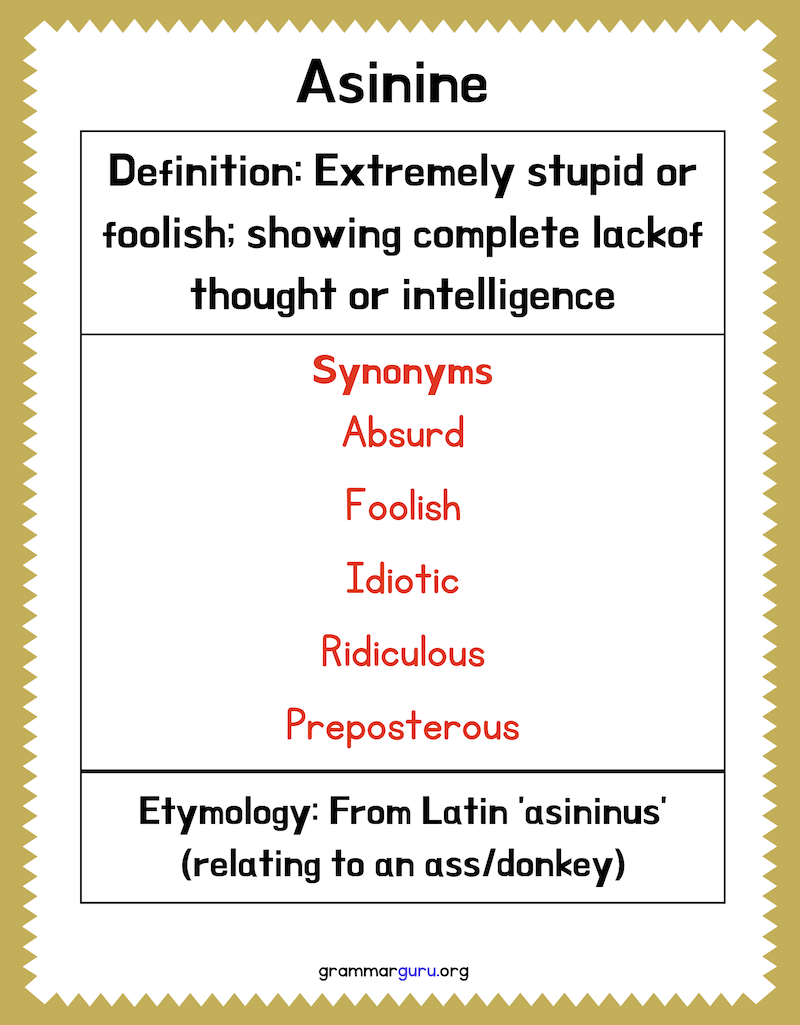If you’re curious about the word asinine, you’re not alone! This unique term often raises questions about its meaning, usage, and origins. Below, we’ve compiled a list of frequently asked questions (FAQs) to help you better understand this intriguing word.
FAQs on Asinine
1. What does asinine mean?
Answer: “Asinine” is an adjective used to describe something that is extremely foolish, silly, or stupid. It often carries a tone of criticism or disdain, making it a strong way to express disapproval of someone’s actions, ideas, or behavior.
2. Where does the word asinine come from?
Answer: The word “asinine” comes from the Latin word asinus, which means “donkey.” Donkeys are often stereotyped as stubborn or unintelligent, which is why “asinine” has come to describe foolish or senseless behavior.
3. How do you pronounce asinine?
Answer: “Asinine” is pronounced as /ˈæs.ɪ.naɪn/ or “AS-uh-nine.” It has three syllables: as-i-nine.
4. What are some synonyms for “asinine”?
Answer: Some common synonyms for “asinine” include:
- Foolish
- Idiotic
- Senseless
- Absurd
- Ridiculous
- Inane
- Preposterous
- Ludicrous
- Moronic
- Brainless
Each synonym carries a slightly different tone, so choose the one that best fits your context.
5. Is asinine an insult?
Answer: Yes, “asinine” can be considered an insult, depending on the context. It’s a strong word used to criticize someone’s actions or ideas as foolish or stupid. However, it’s not as harsh as some other insults, so it’s often used in more formal or intellectual settings.
6. Can asinine be used in a formal context?
Answer: Yes, “asinine” can be used in formal contexts, but it should be used carefully. Because it carries a strong tone of criticism, it’s best reserved for situations where you want to emphasize the foolishness or absurdity of something.
7. What’s the difference between asinine and stupid?
Answer: While both words describe a lack of intelligence or good judgment, “asinine” often implies a sense of absurdity or senselessness. “Stupid” is a more general term, while “asinine” suggests that something is not only foolish but also ridiculous or unreasonable.
8. Can asinine describe things other than people?
Answer: Absolutely! “Asinine” can describe actions, ideas, statements, plans, or even situations. For example:
- “The company’s asinine policy led to widespread frustration.”
- “It was an asinine decision to go hiking without proper gear.”
9. Is asinine related to donkeys?
Answer: Yes, the word “asinine” is derived from the Latin word asinus, meaning “donkey.” Donkeys are often stereotyped as stubborn or unintelligent, which is why “asinine” has come to describe foolish behavior.
10. How can I use asinine in a sentence?
Answer: Here are a few examples:
- “His asinine remark during the debate cost him credibility.”
- “It’s asinine to think that skipping meals will help you lose weight in a healthy way.”
- “The politician’s asinine proposal was quickly dismissed by experts.”
11. Is asinine a common word?
Answer: “Asinine” is not as commonly used as words like “stupid” or “foolish,” but it’s still a well-known term, especially in formal or literary contexts. It’s a great word to use when you want to add variety to your vocabulary.
12. Can asinine have a positive meaning?
Answer: No, “asinine” is almost always used in a negative sense to describe something foolish, absurd, or unreasonable. It’s not typically used to convey positive or neutral meanings.
13. What’s the opposite of “asinine”?
Answer: The opposite of “asinine” would be words that describe intelligence, wisdom, or sensibility. Some examples include:
- Sensible
- Intelligent
- Wise
- Rational
- Logical
- Prudent
14. Is Asinine a bad word?
Answer: While “asinine” is not as offensive as some other insults, it can still come across as harsh or insulting, depending on the context. It’s best to use it thoughtfully and avoid directing it at someone personally unless you intend to criticize their actions or ideas strongly.
15. Can “asinine” be used humorously?
Answer: Yes, “asinine” can be used humorously, especially when describing something so absurd or ridiculous that it’s almost funny. For example:
- “His asinine attempt to build a rocket in his backyard was both hilarious and terrifying.”

See more:
